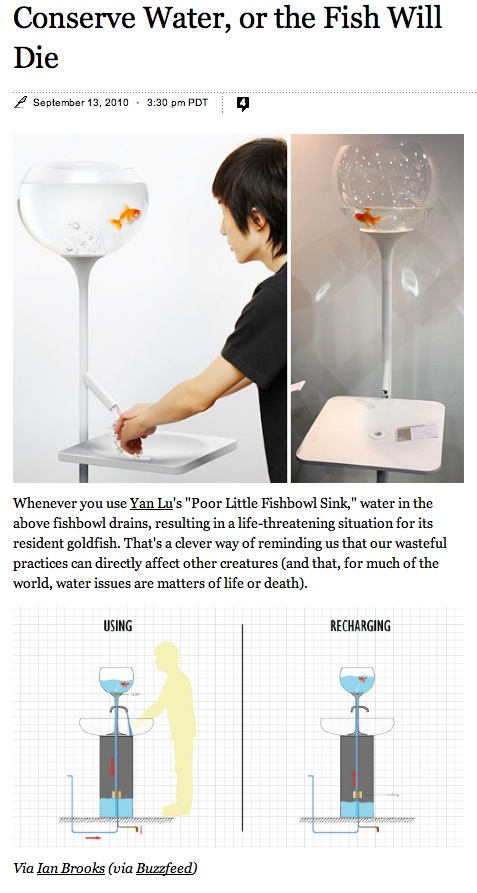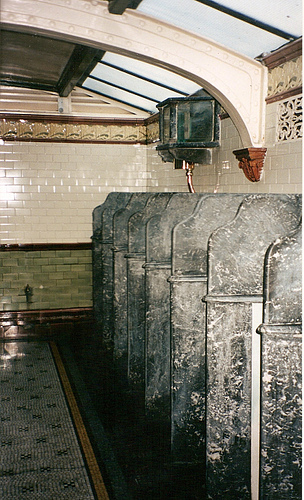Conserve Water, or the Fish Will Die
-
Conserve Water, or the Fish Will Die! A novel way of getting the message across


-
Can't wait to see what this guy does with power consumption. (Leave the light on and Rover gets fried?)

-

-
so this devise makes you use twice the water? the stuff you drink plus the stuff that emties from the fishtank.
 are people really that stupid!
are people really that stupid!  DAMN, besides we live in a closed ecosystem, the amount of water on the earth is the amount of water, you can't get rid of it unless you blast it into space. you can only change its form, BUT, since we can do this at will; whats the problem?
DAMN, besides we live in a closed ecosystem, the amount of water on the earth is the amount of water, you can't get rid of it unless you blast it into space. you can only change its form, BUT, since we can do this at will; whats the problem? -
I wonder if it is fish water that you are washing your hands with.....

That device wouldn't work in my town. Our water is so toxic, the fish has a better chance at surviving without being in water than being in our drinking water.
-
Do the fish know they are in water?
-
And in My town the fish will have great teeth, as we have some kind of flouride in our water.
How do you feed the fish? do you feed it? if you do feed it do you drink the poop?
-
@xrok1 said:
we live in a closed ecosystem, the amount of water on the earth is the amount of water, you can't get rid of it unless you blast it into space. you can only change its form, BUT, since we can do this at will; whats the problem?
Simply not the case, I'm afraid. Water can be destroyed very easily. Just run it through a chemical reaction that results in no water on the output side.
Sure, lots of those reactions are part of living things and tend to (eventually) release roughly the same amount. Not all though. Water gets bound into concrete for the fairly long term, for example. It gets pulled into subduction zones and held in some form within the lithosphere for potentially billions of years. It can be split by ultra-violet and the oxygen and hydrogen go their separate ways, with the hydrogen possibly departing the Earths regions since it is so light. Water simply isn't immutable; we gain some from space occasionally or from chemical reactions and we lose some.The key problem isn't the total amount, anyway. It's the amount available in a practical sense that matters. Much of human civilisation takes their water from large aquifers of glacial melt. Draw down the aquifer faster than it fills, or melt your glacier, and pretty soon your city will die. I'm told Adelaide may be the first city in recent history to suffer this fate.
-
I presume that the fish is in plastic?

Effect will be the same and more prudent for the fish
-
@unknownuser said:
While using, the level of water in the bowl gradually falls (but does not actually drain out); it will go back to the same level once the water stops running. As well, the water from the tap is pure, as its pipeline does not connect to the bowl.
So i assume one could use a real fish there

-
We have our own fishtank, as we live off of only rainwater collection. It really opened my eyes to how much water I used to waste, (simple things like keeping the tap running when brushing my teeth).
Canadians are among the worst water wasters at an average of 329 Litres, 72 gallons per day per person.
Because I have my "fishtanks", which are 3 cisterns with a total capacity of 6500 Gallons (29,500 L) I can calculate our usage, and we average 23 gallons/person/day (105 Litres).* In Canada, about 65% of indoor home water use occurs in our bathrooms. Toilets are the single greatest water user. Here's the breakdown for residential indoor water use in Canada: o 35% bathing and showering (5 min shower: 100L (22 gal), tub bath: 60L(16.2 gals) o 30% toilet (one flush: 15-19L)(3.2-4.4 gal) o 20% laundry (washing machine: 225L)(49.5 gals) o 10% kitchen and drinking (dishwasher: 40L, dishwashing by hand: 35L)(7.7-8.8) o 5% cleaning (hand washing with tap running: 8L, brushing teeth with tap running: 10L)(2 gals)The fishtank maybe not a bad idea.

Besides if we run out of water, how are we going to brew beer!
-
@unknownuser said:
Besides if we run out of water, how are we going to brew beer!
forget the beer, how will you play hockey without ice?

-
@solo said:
@unknownuser said:
forget the beer, how will you play hockey without ice?

Damn you really know how to Tug on the old Canadian heartstrings, no hockey

No Beer after hockey
-
This is reminding me I need to watch "Strange Brew" again

-
@tim said:
@xrok1 said:
we live in a closed ecosystem, the amount of water on the earth is the amount of water, you can't get rid of it unless you blast it into space. you can only change its form, BUT, since we can do this at will; whats the problem?
Simply not the case, I'm afraid. Water can be destroyed very easily. Just run it through a chemical reaction that results in no water on the output side.
Sure, lots of those reactions are part of living things and tend to (eventually) release roughly the same amount. Not all though. Water gets bound into concrete for the fairly long term, for example. It gets pulled into subduction zones and held in some form within the lithosphere for potentially billions of years. It can be split by ultra-violet and the oxygen and hydrogen go their separate ways, with the hydrogen possibly departing the Earths regions since it is so light. Water simply isn't immutable; we gain some from space occasionally or from chemical reactions and we lose some.The key problem isn't the total amount, anyway. It's the amount available in a practical sense that matters. Much of human civilisation takes their water from large aquifers of glacial melt. Draw down the aquifer faster than it fills, or melt your glacier, and pretty soon your city will die. I'm told Adelaide may be the first city in recent history to suffer this fate.
with all the new hydrogen fuel cell vehicles out there
 you can simple drink from someones tailpipe anyway!
you can simple drink from someones tailpipe anyway! 
-
@xrok1 said:
so this devise makes you use twice the water? the stuff you drink plus the stuff that emties from the fishtank.
Well, I agree that would be senseless, but from what I can tell, the fish tank water is not used - it is drawn down into the lower tank while you are running the tap (presumably some device driven by the water flowing to the tap) and flows (syphons?) back when the tap is closed.
Interesting engineering, but can't help thinking that there are plenty of kids out there who would just love to run the tap and drain the bowl completely for fun!
-
This is not new... [flash=640,390:1yrrw69i]http://www.youtube.com/v/R6SjcwBMdrI&hl=en_US&feature=player_embedded&version=3[/flash:1yrrw69i]
and a Victorian Goldfish Urinal [can't find better image!] or the Japanese! [flash=640,390:1yrrw69i]http://www.youtube.com/v/w_XFw-TrHNw&hl=en_US&feature=player_embedded&version=3[/flash:1yrrw69i]
or the Japanese! [flash=640,390:1yrrw69i]http://www.youtube.com/v/w_XFw-TrHNw&hl=en_US&feature=player_embedded&version=3[/flash:1yrrw69i]  Loads more here http://wn.com/Aquarium_toilet
Loads more here http://wn.com/Aquarium_toilet
Advertisement







